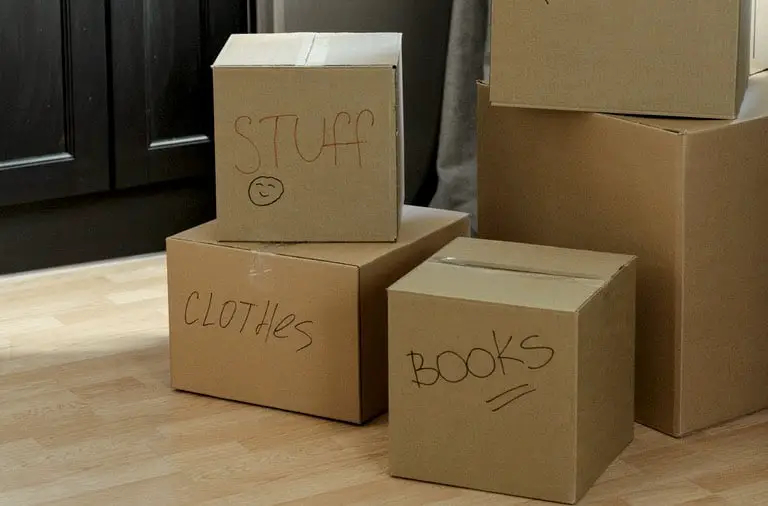Your tenant has vacated, and you have new a tenant ready to move in. But then you discover that your former tenant has not taken all their belongings with them! What do you do? And how long can someone leave their belongings on your property before you can dispose of them?
As a general rule, a reasonable time frame that someone can leave their belongings on your property is 21 days before you can consider disposing of them. Landlords must serve a notice to the tenants to inform them that they intend to dispose of the goods as per Schedule 1 of the Torts (Interference with Goods) Act 1977.
It can be both annoying and frustrating when a tenant leaves some of their possessions on your rental unit after they have moved out. Especially when you have new tenants who are ready to move in. As I have already mentioned, there is a specific law, and tenants still have legal rights when they burden you with their stuff. So it’s essential for you to know and understand the legal steps before you do anything.
Tenants have been known to leave personal items like clothes, furniture and white goods and even motor vehicles. But, of course, one of the most common items is rubbish, which they no longer want and haven’t had the common courtesy to clear out.
Before I continue any further, there are two legal terms that you need to be familiar with, with regards to tenants leaving behind their belongings:
Involuntary Bailee – This is you, the landlord. You didn’t volunteer your services to look after someone’s personal belongings. Still, you have found yourself in a situation where you are required to keep the possessions in your care.
Bailor – This is your inconsiderate tenant, who has not had the common decency to remove all their belongings, or at least communicate with you if they have had issues with vacating the rental property in time.

There is good news, though, as thankfully, landlords do have a couple of tools in their toolbox to help motivate tenants to remove their belongings after they move out. The belongings must be kept in a safe place and not disposed of until reasonable efforts have been made to allow the previous tenant to collect them.
Contents
Tenancy Agreement and the Tenants Deposit
There should be a clause within the tenancy agreement that states that the property should be left in an ‘as-found’ condition. The property owner should then have the option to charge a fee for storage if heavy items are left behind, which require moving before a new tenant moves in, or for cleaning and clearance if the previous tenant has left rubbish.
Providing there is such a clause within the tenancy agreement and that the landlord obtains receipts for any storage costs or cleaning expenses, then the landlord will be able to submit a claim to the Tenants Deposit Protection scheme.
If you did not take a deposit when the tenant first moved into the property, or if the deposit is not big enough to cover the expense of removals or storage, then you need to act quickly to get the tenant to remove the items themselves so that you can continue to let your property to a new tenant.
If you choose to remove the items yourself, then it is essential that you do not damage any of the tenant’s personal property in any way. It is also advisable to take photographs and create an inventory of the items that are being removed. If you have any other concerns about moving the tenant’s possessions, you should seek legal advice.
Landlords and property managers need to be highly cautious when letting a tenant return to collect their belongings after the tenancy has expired. If the tenant refuses to leave, they may have taken possession of the property, which will then require legal action and a writ of possession to get them out!
At the very least, the landlord or agent should take the tenant to a place of storage to allow them to gather their things and not let them re-enter the property.
Items left behind by the tenant still belong to them, and the landlord cannot lawfully claim ownership until ‘reasonable’ efforts are made to contact the tenant and request that the items are collected.
This leads me to your next option …
Serve notice to the tenant
Inform the tenant in writing that you intend to dispose of their belongings by either dumping them or selling them if they have value.
If you are a landlord and have served a valid notice as per Schedule 1 of the Torts (Interference with Goods) Act 1977, the personal possessions of your tenants cannot be removed from your property until at least 21 days after the date on which you serve the notice.
If the goods are not collected within this timeframe, then the landlord has the right to sell or dispose of them.

The written notice provides evidence that you have made a reasonable attempt to inform the tenant of your intentions, and if they do not reply, it can be considered that the tenant has genuinely abandoned their belongings.
Just be sure to send any notices via a recorded delivery service so that you have proof that the notice was served and received.
The notice should include specific information including:
- The location of the tenant property.
- How the tenant can arrange collection.
- If the belongings are to be sold, a notice of the sale including location or method of the sale, i.e. online public auction.
- Notification that the sale and storage costs will be deducted from the proceeds of the sale.
- An inventory of the tenant’s property that is being stored.
If the tenant later disputes that they did not abandon their belongings, the landlord can produce the notice as evidence that they acted reasonably and in accordance with their obligations.
The notice should also be displayed at the property, ideally on the inside of a window near the front door so that the tenant can see it from the outside. In the case of an abandoned vehicle, the notice should be displayed clearly on the inside of the windscreen.
If you don’t have a forwarding address for the bailor, you must take reasonable steps to contact them via the phone number, email address, their place of work, friends, family, social media or anything else you can think of.
One other option is to try a tracing service such as vilcol.com, which is relatively cheap and has a no-find, no-fee policy. If the trace is successful, you can pass the fee onto the bailor or recoup the cost after any items have been sold.
Involuntary bailees who do not take reasonable steps to contact the bailor will be at risk of civil action if they are later accused of unlawfully selling or disposing of the belongings.
One more important thing to note: Proceeds from the public sale of uncollected belongings must be accounted for and kept for at least 6 years.
Landlords are advised to obtain receipts before deducting the costs of storage, selling fees, or other reasonable costs, and the remaining balance must be kept aside for the tenant to collect.
Landlords must also be able to prove that any sales were a true reflection of the value of the property.
Can Landlords Sell Tenants Belongings To Cover Rent Arrears?
Landlords cannot sell tenants’ belongings to cover any rent arrears. Doing so would be a civil offence and could result in a court order. Tenants can take civil action against landlords who sell their belongings to assist with having the items returned or replaced and compensated for any damages.
There are different rules and strict procedures that landlords have to follow in order to claim rent arrears, and they do not include selling the tenant’s abandoned personal property to recoup the money owed.
Prevention Advice For Landlords
Here are some steps that landlords should take to protect themselves, or at least minimise the risk, of a tenant vacating a property without clearing the rubbish or leaving behind personal belongings that the landlord will be obliged to take care of:
Tenant Referencing
Where a prospective tenant is applying for a tenancy, landlords are strongly advised to check their references. Paying for comprehensive reference is relatively cheap compared to the ills that could occur if you allow an unsuitable person to reside in your property.
Tenant Deposits
When deciding whether to request a deposit at the start of the tenancy, remember that it is not just beneficial for the protection of any unpaid rent or damages, but for the cleanliness and clearance of the property at the end of the tenancy too.
Tenancy Agreement Clauses
Check the tenancy rental agreement and, if necessary, amend any details which can reduce the length of time a tenant can leave belongings in your property. For example, it will be much easier for you to dispose of unwanted belongings if the clause states they are to be removed within 14 consecutive days of vacating instead of 3 months.
Provide An Inventory
A detailed photographic inventory of the items included in the tenancy will assist you when the tenancy agreement comes to an end. Photos of items that do not belong to the property can be sent to the tenancy deposit protection scheme to support your claim of having to get the items removed.
Check-In & Check-Out Reports
Likewise, by conducting a thorough check-in and check-out report, you will have sufficient evidence to support any financial claims you may wish to make to the tenant’s deposit protection scheme.
Landlords have a responsibility to make arrangements for tenants to collect their personal belongings after they have vacated the property.
This includes making a ‘reasonable’ effort to contact the tenant and serving notice to inform them that their items will be disposed of if they do not hear back. If landlords fail to do this, they can be held liable for any damages that may occur.

